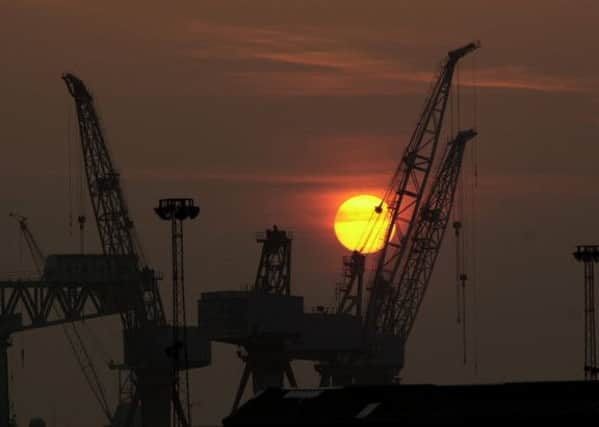Case for No: Breakaway will cost jobs, security


From the challenges of globalisation, to the intelligence needed to keep us safe and the economic implications of separating our defence forces, the nationalist argument falls down on each and every aspect.
Advertisement
Hide AdAdvertisement
Hide AdAs part of the UK, Scots have a high level of security in a dangerous world. Service personnel from Scotland, England, Wales and Northern Ireland work together in our armed forces to keep us safe at home and tackle threats around the world.
Scots like the security that the UK armed forces provide. In the Scottish Social Attitudes survey from earlier this year, only 27 per cent think that if Scotland becomes independent she should have her own army, navy and air force, while a massive 67 per cent believe that even in the event of separation, Scotland should have a joint armed forces with the rest of the UK. The truth is that’s not an option – if we go it alone we don’t get to stay under the protective umbrella of the UK armed forces, and I understand why that worries folk.
The UK has an international influence that few states can match. We are a permanent member of the UN Security Council, a leading member of the EU and a founder member of Nato as well as part of the G7, G8 and G20.
A separate Scotland simply would not be able to match that level of international clout. It would not be able to replicate the UK’s extensive and long-standing network of bilateral defence relationships. The UK works together with countries around the world on maximising defence capabilities, on training, on research and development, and on the intelligence essential for UK national security, not to mention on vital contracts for the defence industry.
The UK has one of the largest defence budgets in the world at £34 billion, and Scotland benefits from every single pound of money spent. In comparison, the nationalists propose to spend only £2.5bn on defence, intelligence and cyber capabilities. That is roughly 7 per cent of the combined UK budget, and less than countries such as Denmark and Norway spend on defence alone. It is not enough to provide the level of defence and security we currently have as part of the UK.
Now take a look at the SNP’s White Paper. There is not a single costed procurement pledge in it. Instead their plan is simple – write a wish list of equipment you want to take from the UK. Except the UK’s defence infrastructure cannot be easily disaggregated, and the UK Government may want to keep its equipment. It may, in the independence negotiations, decide on a financial settlement, once liabilities and assets have been taken into account. What then? Does the new Scottish Government buy second hand and make do with equipment designed and built for another air force, navy or army? Or does it order new? If it does, Scotland will be facing, potentially, an undefended decade. And what will the costs be? These are the questions the nationalists had to have answers to by now to be credible on defence, but they do not and they are not.
UK defence sustains thousands of jobs in Scotland – from those who serve on the front line to those working in industry.
Separation will not only have an impact on our national safety, but it will have a devastating effect on Scottish defence jobs. Under the SNP’s plans, the UK Clyde naval base will close. It will be replaced by a Scottish naval base, which will not employ anywhere near the same number of people as are currently based there. Don’t take my word for it, look at the SNP’s own plans or ask the civilian employer at the base.
Advertisement
Hide AdAdvertisement
Hide AdThis is important too for our shipyard workers on the Clyde and at Rosyth and in the many companies in the supply chain to the yards. As part of the UK our shipyards get special preference when it comes to allocating billions of pounds’ worth of contracts, like the magnificent Queen Elizabeth-class carriers. The UK simply does not build complex warships in other countries. That’s why John Dolan, GMB union convenor at the Clyde yards, has described the SNP’s defence plans as “complete fantasy” which would lead to “yard closures”.
Whatever the constitutional settlement, Scottish politicians like me will argue for defence contracts and jobs, but the building of complex warships is regarded by the UK as a sovereign capability and we have a responsibility to deal in the truth, not assumption and assertion. If we leave the UK, Scottish yards will not have access to the contracts they currently bid for and get.
Many of us are saying “No thanks” because we believe the UK gives us the best of both worlds through pooling our resources and sharing the risks. Nowhere is that better illustrated than in the defence of all of us on these islands. By pooling our defence resources the four nations of the UK are better protected than we would be by breaking apart. I suggest we keep it that way and say “No thanks” on 18 September.
DEFENCE STATS AND FIGURES
• The UK has the fourth-largest defence budget in the world
• Our armed forces are made up of 142,500 regulars and nearly 35,000 trained volunteer reserves
• The UK has a seat at the top table in world affairs. We are a permanent member of the UN’s Security Council, giving us unique influence in the world
• The SNP’s proposed cut in defence spending would leave a separate Scotland with a smaller budget than countries such as Denmark and Norway
• The defence sector in Scotland today employs around 12,000 people
• The UK does not build warships in foreign countries
• Gemma Doyle is Labour MP for West Dunbartonshire, and Shadow Minister for Defence Personnel, Welfare and Veterans